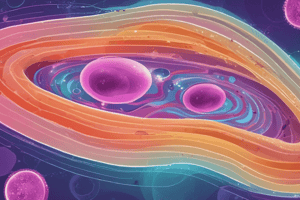Podcast
Questions and Answers
What is the main mechanism for transporting the zygote through the fallopian tube?
What is the main mechanism for transporting the zygote through the fallopian tube?
- Enzymatic digestion
- Ciliary movement (correct)
- Oxygen diffusion
- Muscular contractions
Where does the fertilization process begin?
Where does the fertilization process begin?
- Ovary
- Fallopian tube (correct)
- Uterus
- Cervix
What are the finger-like projections that surround the ovary called?
What are the finger-like projections that surround the ovary called?
- Fimbriae (correct)
- Crypts
- Cilia
- Villi
What is the narrowest part of the oviduct called?
What is the narrowest part of the oviduct called?
What is formed after a sperm fertilizes an egg?
What is formed after a sperm fertilizes an egg?
Which structure guides the embryo towards the uterus?
Which structure guides the embryo towards the uterus?
What is a critical step in the fertilization process?
What is a critical step in the fertilization process?
What is the role of chemical signals released by the follicle in the fertilization process?
What is the role of chemical signals released by the follicle in the fertilization process?
What occurs when the sperm penetrates the outer layers of the egg?
What occurs when the sperm penetrates the outer layers of the egg?
What is the function of the enzymes released by the embryo during implantation?
What is the function of the enzymes released by the embryo during implantation?
What happens when the embryo reaches the uterus during implantation?
What happens when the embryo reaches the uterus during implantation?
What is essential for understanding the early stages of human conception and development?
What is essential for understanding the early stages of human conception and development?
What is involved in tubal transport of the zygote?
What is involved in tubal transport of the zygote?
What does the implanted embryo become?
What does the implanted embryo become?
What is responsible for helping the embryo to burrow into the endometrium during implantation?
What is responsible for helping the embryo to burrow into the endometrium during implantation?
Flashcards are hidden until you start studying
Study Notes
Tubal Transport of the Zygote: A Comprehensive Guide
The tubal transport of the zygote is a crucial process in the early stages of human conception, involving the movement of the fertilized egg from the fallopian tube to the uterus. This article provides a detailed overview of the fertilization process, oviduct structure, ciliary movement, sperm-egg interaction, and embryo implantation.
Fertilization Process
The fertilization process begins when a sperm fertilizes an egg, forming a zygote. The zygote undergoes several cell divisions, forming the embryo. The embryo then descends through the fallopian tube, guided by the cilia, until it reaches the uterus.
Oviduct Structure
The oviduct, or fallopian tube, is a long, narrow tube that extends from the uterus to the ovary. It is divided into two parts: the infundibulum, which is the funnel-shaped widest part, and the ampulla, which is the narrowest part. The fimbriae, or finger-like projections, surround the ovary and help to capture the ovum (egg) as it is released from the ovary.
Ciliary Movement
Ciliary movement is the main mechanism for transporting the zygote through the fallopian tube. The cilia, tiny hair-like structures, cover the lining of the fallopian tube and beat in a coordinated wave-like motion, pushing the zygote along. This movement helps to guide the embryo towards the uterus.
Sperm-Egg Interaction
Sperm-egg interaction is a critical step in the fertilization process. Sperm are attracted to the egg by chemical signals released by the follicle. The sperm then penetrate the outer layers of the egg and enter the zygote. Once inside the zygote, the sperm's head fuses with the zygote's membrane, and its DNA merges with the egg's DNA.
Embryo Implantation
Embryo implantation occurs when the embryo reaches the uterus and embeds itself in the endometrium, the lining of the uterus. The embryo releases enzymes that help it to burrow into the endometrium, and it begins to develop a connection with the woman's blood supply. The implanted embryo becomes a fetus, and the fetus grows into a baby.
In conclusion, the tubal transport of the zygote is a complex and fascinating process that involves several key steps, including fertilization, oviduct structure, ciliary movement, sperm-egg interaction, and embryo implantation. Understanding these processes is essential for understanding the early stages of human conception and development.
Studying That Suits You
Use AI to generate personalized quizzes and flashcards to suit your learning preferences.



